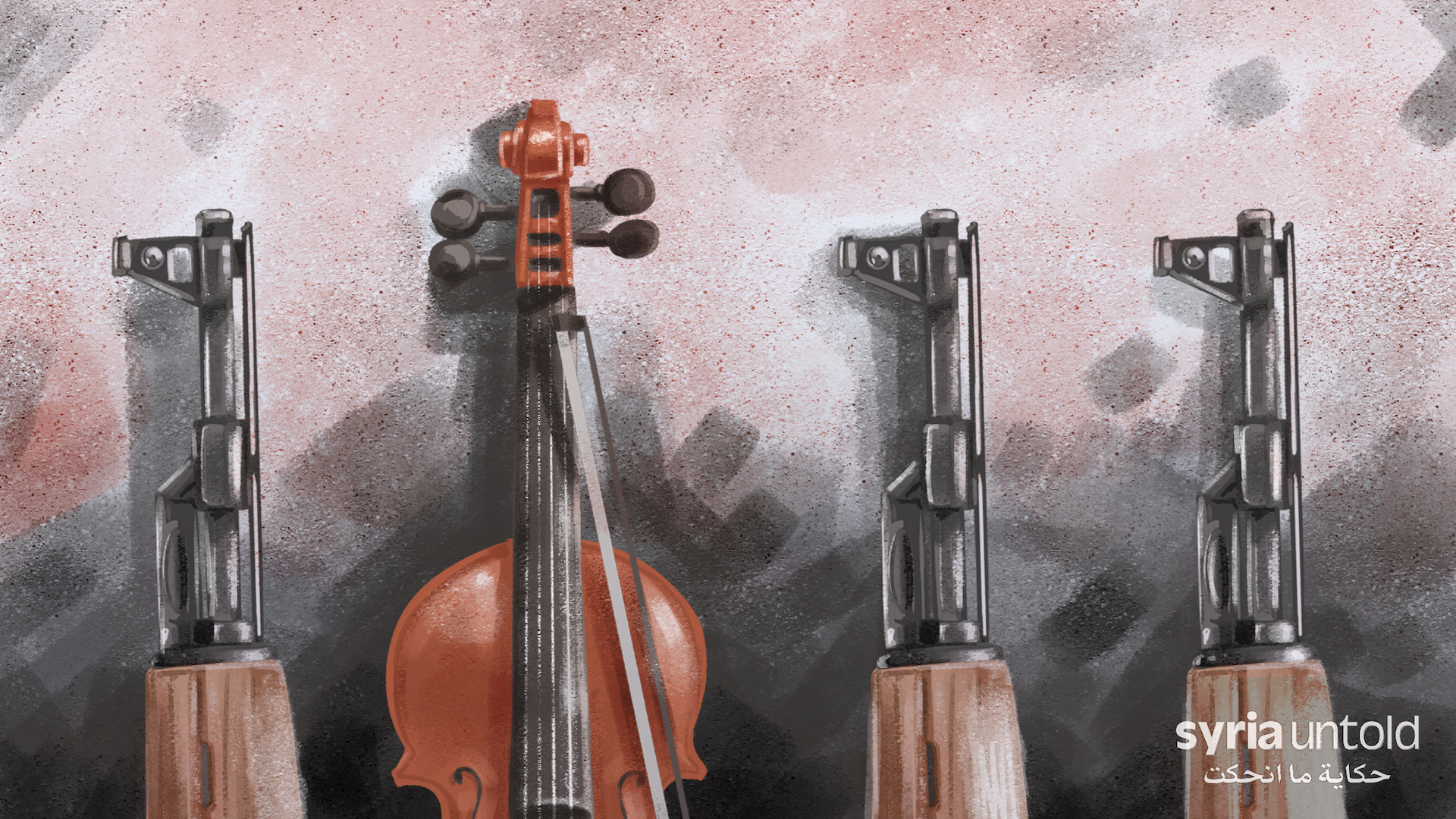All names in the story have been changed
(Damascus) Hope filled Moudder when he learnt that his friend and musical peer, Assem, was finally being discharged along with the rest of the officers from Class 102. After a long and painful wait that spanned eight years and several brushes with certain death, Assem was finally coming home.
Assem had first joined the army in 2011 after he graduated from music college in Homs. At the time, military service wasn’t seen as the life sentence it later morphed into. For Assem, he simply wanted to get it out of the way, thinking he could bribe the officer-in-charge whenever he felt he wanted to take a break. Unbeknownst to him, he would spend the next eight years fighting on some of the most dangerous fronts in the city of Aleppo. He watched his peers die, taking their last breaths as they lied in his arms. He picked up severed limbs and carried bodies whose faces were no longer recognizable. He witnessed young men laugh, cry, and scream hysterically in groups, while others shot themselves to get leave or to be discharged.
His ears bled from the sound of explosions and deafening bombing. He used a Russian-made RPG on more than one occasion, but he didn’t know if anyone got hurt. In moments to combat, raids, attacks and counter attacks, nothing was clear. Guns were shot at random, while young men struggled in a sea of panic and continued shooting in self-defense, like blindfolded slaves placed in a fighting ring.
As for Moudder, he was conscripted in 2014. Unlike Assem, he was fortunate enough to spend most of his military service on relatively quiet fronts at a camp for the displace in Adra and Qatna in rural Damascus. He is still serving in the army and doesn’t expect to be discharged anytime soon. However, the decision to discharge the officers of Class 102 months after rumors circulated it would happen following the end of the battle of Ghouta gave Moudder hope that getting out alive was still a possibility. He was trying to stay alive until the day of his discharge arrived.
At the first possible chance, Mouddar visited Assem at his home in Jaramana in Damascus. He bought a kilo of Halawet el-Jibn, a cheese confection, which he knew his friend loved. At the house, it felt like a celebration for the return of a kidnapped or missing person. Assem’s mother worriedly followed her son’s every move, as if she was afraid the military police would magically appear from under the table or behind the bookshelf to take Assem away again.
Ana Wiyak - The War of Anthems
19 December 2018
“Get your violin, man. I’ve missed singing with you,” said Moudder.
Assem laughed nervously. He opened his violin case and took out his violin and bow. He tuned his instrument and, with shaky hands, started playing.
Moudder, who was a professional singer, chose a famous song by renowned Egyptian composer Mohammad Abdel Wahab. Assem missed a few notes but was able to finish the sing. The crowd, mainly composed of Assem’s relatives, cheered and clapped.
“Play something for Wadih al-Safi, for Farid Al-Atrash…”
Assem laughed as he felt the blood rushing in his veins and felt life return to his instrument. The impromptu Tarab session, where Assem played and Moudder sang, went on for hours. The crowd sang along sometimes before Assem’s mother served tea, matte, Arak, Tabbouleh, and the sweets Moudder had brought.
“Assem, don’t you want a piece? I bought it especially for you from the square,” explained Moudder.
“To be honest, I have diabetes,” replied Assem.
“What? How did that happen?”
Assem laughed. “Aleppo.”
Moudder shook his head. “I don’t understand.”
“I was in Aleppo when the armed factions attacked the infantry school at the end of 2012. I was terrified, it must’ve knocked a few good years off of me. I survived, but it left me with diabetes and shaky hands.”
Assem’s mother introjected. “All that matters is that he’s back safely. Everything else is doesn’t matter.”
“Musicians at the front? This is shameful. What do you know about guns and tanks?” shot one of the visitors.
Assem wanted to say that most of his peers in the army preferred to be elsewhere, and that all of them – including those of survived any direct injuries – are suffering from deep psychological trauma due what they’d endured and seen in the years during their service, which, at that time, seemed like it would never end.
Instead, he turned to Moudder and said, “Let’s have a cigarette on the balcony.”
The two sat on nylon foldable chairs, leaning over an old Formica table that had been weathered by the sun and rain. They smoked two rollies, one of which was between Assem’s shaky fingers.
“Man, I’ve been filling in applications since day one to be transferred to the theater or army orchestra. It’s futile. The minute they figured out I sing in my brigade, they wouldn’t let it be. The commanding officer keeps calling me ‘lame-ass singer.’ It’s ‘come here lame-ass singer’ and ‘go there, lame-ass singer,’” said Moudder.
Assem sighed. “Forget it, man. Do you remember Imad? He tried pulling all strings so he wouldn’t be placed on the front and would be transferred to the army orchestra. In the end, he ended up in the line of fire. There was a fight, and everyone he was with died. He was injured, kidnapped, and mistreated. Afterwards, his family were able to get in touch with the brigade that kidnapped him. They paid many millions to let him go.”
“Wow, that’s quite the story! Where is he now? Back in Damascus?” asked Moudder.
“He’s not insane to come back here. The kidnappers released him in Turkey. He was smuggled to Europe and is now living in Holland. He’s playing concerts there and he’s doing just fine,” explained Assem.
Moudder laughed, recalling a similar story of his flute-playing friend Amer. He was conscripted and served in Joubar at one of the more active fronts between the Syrian forces and the Free Syrian Army (FSA).
It was July 2013 when the FSA attacked a police station and a few other buildings where the music brigade was stationed. They stormed in and killed most of the soldiers there. Amer had failed to reach his bullet-proof vest in time, which was hung on the wall above his head. When the FSA entered the building, they executed everyone who had their vests on, but spared Amer’s life and a few others taking them hostage. Amer didn’t know why the FSA members’ decision was connected to the vests. Maybe they considered that those wearing the vests had been actively involved in the fighting. Ironically, Amer was lucky because he didn’t manage to put on his vest in time.
While in captivity, Amer improved his living conditions and of those with him because of his ingenuity. He engineered a simple flute from a plastic pipe, playing popular tunes that caught the fancy of FSA members. In particular, they loved the revolutionary songs against the regime, such as “Leave, Bashar, leave” (Yalla erhal ya Bashar) and “Oh precious motherland” (Ya watanna w ya Ghali), among others.
Every evening, the men would start dancing the Dabke as Amer played his plastic flute. For those few hours each night, he had everyone eating out the palm of his hand. His good luck didn’t end there: in one of the FSA videos where prisoners were forced to look down to conceal their identity, Amer slightly faced the camera for a fraction of a second. It was enough for a friend working in an aid agency in Turkey to recognize him. The friend, in turn, contacted the armed faction holding Amer, which asked for ransom to release the musician. After the money was delivered, Amer was released and is currently seeking asylum in a European country.
Assem took the last drag of his cigarette before he flicked it off the balcony. “Sometimes I feel it’s a dream,” he said. “Eight years and it’s like I’m having an outer body experience. Who is this person wearing the camouflage uniform and loading a rifle? Why am I carrying arms instead of a violin bow? Why am I in a dorm or a dilapidated building fighting someone instead of being on stage? And all those years, if I were practicing and working, what would I have achieved?”
Moudder patted his friend on the shoulder. “Don’t worry, you’ll get it back. You’re only 32 years old,” he told Assem.
“With shaky hands and diabetes. Maybe playing on stage isn’t my thing anymore,” Assem replied.
“Come, let’s go back inside. Everything will be alright before you know it,” Moudder said reassuringly.
The two men walked back inside: Assem with a heavy heart unable to shake off the traumatic past even after his discharge, and Moudder with a single hope that he would kidnapped by armed factions and, with a stroke of luck, end up in Europe.





